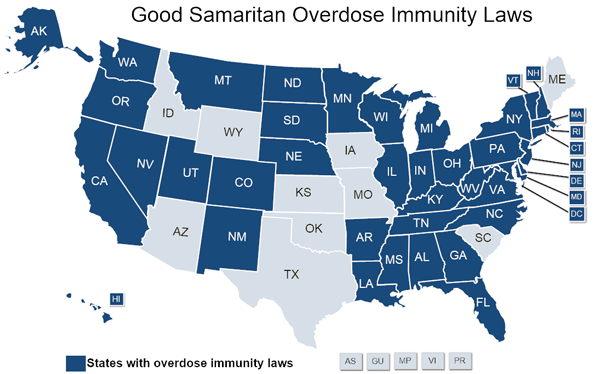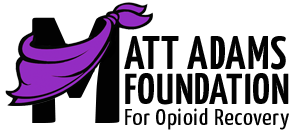Laws by States
We are working to build out this information bank of the Good Samaritan and Naloxone Immunity Laws by state. These laws are put in place to encourage bystanders to ACT if they witness an overdose. If your state has these laws, please DON’T RUN, CALL 911 if you witness an overdose. Please consider carrying Naloxone to have on hand.
Note: We are not providing legal advice as we are not lawyers but we are providing the bills and links to their original document where you can further read up and review.

Arkansas Act 1222: To Enhance The Emergency Services Of First Responders; To Create The Naloxone Access Act; And To Provide Immunity For Prescribing, Dispensing, And Administering Naloxone And Other Opioid Antagonists. Approved 04/07/2015
20-13-1604. Opioid anatgonist — Immunity.
(a) A healthcare professional acting in good faith may directly or by standing order prescribe and dispense an opioid antagonist to:
- A person at risk of experiencing an opioid-related drug 20 overdose;
- A pain management clinic;
- A harm reduction organization;
- An emergency medical services technician;
- A first responder;
- A law enforcement officer or agency; or
- A family member or friend of a person at risk of experiencing an opioid-related drug overdose.
(b) A person acting in good faith who reasonably believes that another person is experiencing an opioid-related drug overdose may administer an opioid antagonist that was prescribed and dispensed under section (a) of this section.
(c) The following individuals are immune from civil liability, criminal liability, or professional sanctions for administering, prescribing, or dispensing an opioid antagonist under this section:
- A healthcare professional who prescribes an opioid antagonist under subsection (a) of this section; As Engrossed: S3/12/15 H3/25/15 SB880 5 03-07-2015 15:15:35 JMB165 1
- A healthcare professional or pharmacist who acts in good 2 faith and in compliance with the standard of care that dispenses an opioid 3 antagonist under subsection (a) of this section; and
- A person other than a healthcare professional who 5 administers an opioid antagonist under subsection (b) of this section.
Full law can be found HERE.
Current Harm Reduction Laws
Syringe Exchange Programs C.R. S. §25-1-520
This law allows local jurisdictions to approve the operations of syringe exchange programs. Participants, volunteers and staff are exempt from the provisions of paraphernalia laws, C.R.S. §18-18-425 to 18-18-430, when they associated with an approved syringe exchange program created pursuant to this law.
Drug Paraphernalia Law Exemption, C.R.S. §18-18-430.5
Syringe exchange program participants are exempt from drug paraphernalia laws, C.R.S. §18-18-425 through 18-18-430.
911 Good Samaritan Law, C.R.S. §18-1-711
The 911 Good Samaritan Law states that a person is immune from criminal prosecution for an offense when the person reports, in good faith, an emergency drug or alcohol overdose even to a law enforcement officer, to the 911 system, or to a medical provider. This same immunity applies to persons who remain at the scene of the event until a law enforcement officer or an emergency medical responder arrives, or if the person remains at the facilities of the medical provider until a law enforcement officer, emergency medical responder, or medical provider arrives. The immunity described above also extends to the person who suffered the emergency drug or alcohol overdose event.
Third Party Naloxone, C.R.S. §18-1-712
This law allows for a person other than a health care provider or health care facility who acts in good faith to administer an opiate antagonist to another person whom the person believes to be suffering an opiate-related drug overdose. The individual who administers naloxone shall be immune from criminal prosecution for such an act.
Naloxone Standing Orders, C.R.S. §12-36-117.7
Signed into law on April 3, 2015, this law concerns the ability to furnish a supply of emergency drugs for purposes of treating individuals who may experience an opiate-related overdose event. This bill allows licensed prescribers to prescribe, and licensed dispensers to dispense, an opiate antagonist, either pursuant to a direct prescriber order or in accordance with standing orders and protocols.
Needle-stick Prevention C.R.S., §18-18-428
Signed into law on April 3, 2015, this law allows for an exception to arrest and filing charges for the crime of possession of drug paraphernalia if the person, prior to being searched by a law enforcement officer, informs the officer that he or she has a needle, syringe, or other sharp objects on his or her person or in his or her vehicle or home that is subject to a search. The exception to arrest and filing charges also applies to the crime of possession of a controlled substance as it relates to any residual controlled substance that may be found in a used needle, syringe, or other sharp object.
Harm Reduction Access (as allowed by state)- Resources included naloxone distribution, fetamyl test strips, various disease testing, syringe exchange programs, and more. Naloxone can be accessed from syringe access providers, harm reduction centers, and methadone clinics in your area.
Alamosa – SHARRP 719.589.4977
Aurora – Aurora Syringe Access 303.239.7078
Boulder-
Boulder AIDS Project 303.444.6121
Mental Health Partners 303.444.6121
The Works Program 303.413.7500
Denver:
Harm Reduction Action Center 303.572.7800
Denver Colorado AIDS Project 303.441.1281
Ft Collins – Northern Colorado AIDS Project 970.243.2437
Lakewood – Points West 303.239.7078
Longmont – The Works Program 303.413.7500
Pueblo –
Southern Colorado Harm Reduction Association 719.289.7149
Southern Colorado AIDS Project 719.248.0372
Part I
Title XV Chapter 94C Section 34A
ADMINISTRATION OF THE GOVERNMENT REGULATION OF TRADE
CONTROLLED SUBSTANCES ACT
IMMUNITY FROM PROSECUTION UNDER SECS. 34 OR 35 FOR PERSONS SEEKING MEDICAL ASSISTANCE FOR SELF OR OTHER EXPERIENCING DRUGRELATED OVERDOSE
Section 34A. (a) A person who, in good faith, seeks medical assistance for someone experiencing a drugrelated overdose shall not be charged or prosecuted for possession of a controlled substance under sections 34 or 35 if the evidence for the charge of possession of a controlled substance was gained as a result of the seeking of medical assistance.
(b) A person who experiences a drugrelated overdose and is in need of medical assistance and, in good faith, seeks such medical assistance, or is the subject of such a good faith request for medical assistance, shall not be charged or prosecuted for possession of a controlled substance under said sections 34 or 35 if the evidence for the charge of possession of a controlled substance was gained as a result of the overdose and the need for medical assistance.
(c) The act of seeking medical assistance for someone who is experiencing a drugrelated overdose may be used as a mitigating factor in a criminal prosecution under the Controlled Substance Act, 1970 P.L. 91?513, 21 U.S.C. section 801, et seq.
(d) Nothing contained in this section shall prevent anyone from being charged with trafficking, distribution or possession of a controlled substance with intent to distribute.
(e) A person acting in good faith may receive a naloxone prescription, possess naloxone and administer naloxone to an individual appearing to experience an opiaterelated overdose.
Full law can be found HERE.


